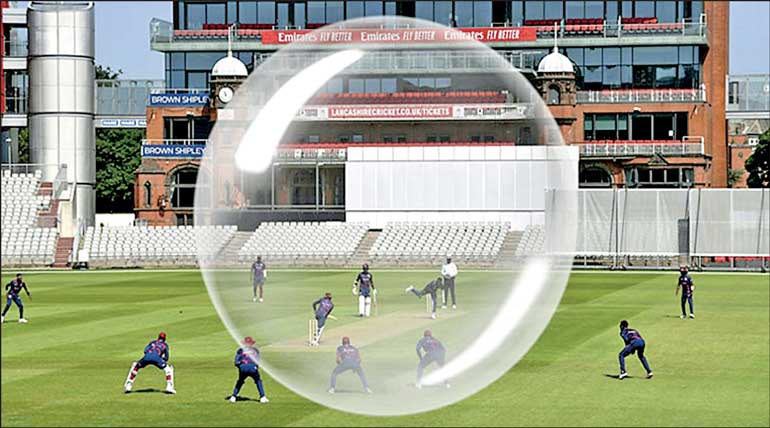Wednesday Feb 18, 2026
Wednesday Feb 18, 2026
Monday, 14 June 2021 00:06 - - {{hitsCtrl.values.hits}}

Bio-bubble has been an important measure in conducting cricket in times of COVID-19
By Sa’adi Thawfeeq
Sri Lanka Cricket (SLC) are aware of the mental health of its cricketers staying in bio-secure bubbles for long periods of time and said that it was doing everything possible to reduce the stress.
Sri Lanka’s white ball cricketers currently in England for a six-match tour (3 T20Is and 3 ODIs) have been in a bubble prior to the commencement of their three-match ODI tour to Bangladesh last month, and according to SLC CEO Ashley de Silva, they will continue staying in the bubble upon their return from England in the first week of July as they are due to commence another six-match white ball series (3 ODIs and 3 T20Is) against India at home from 13-25 July.
Thus, by the end of the Indian series, the white ball cricketers would have remained in a bubble for over two months.
“The bubble will continue after the England tour. The players who get selected to play in the Indian series will remain in the bubble, the rest will check out after completing their quarantine period,” said de Silva. “The players are not allowed to go anywhere but they will remain in the hotel itself once they return from England.”
Being in the bio-secular bubble is not easy it could affect the players’ mental health and to a great extent, their performances as well.
When asked what effect it will have on the players’ mental health to be away from their families and be confined only to their hotel rooms apart from the training and match days, de Silva replied: “It does affect the players, it is very stressful and we all know that, but there is no choice. All the countries are going through this phase and it all depends on each individual how they can cope up with it. This is the only way we can do to make the players as comfortable as possible.”
“We allow the players’ wives to join them but only after going through the proper health protocols. For example, prior to the team’s arrival, the wives will do the PCR testing and check into the hotel four days before. After the players check into the hotel and after the fifth day, the wives will do another testing and if it is negative, only then will they join the players,” explained de Silva.
“If the wives want to stay with the players in the hotel room, they can as long as they are in the bubble. They are not allowed to go back home and come and meet the players again. If they go out of the hotel, they cannot come back.
“We have all the security in the hotel and they are very strict, they won’t allow anyone to step out of the hotel. Once you create the bubble and when everybody is negative, there is a dining area where the wives can move around with the players. The food will not be served into the room, they can go into that area and have their meals and all that,” he said.
Speaking on the mental factor that could affect the players the Indian captain said: “With the current structure and the structure that we are competing inside it, to be very honest for a long period of time it is very difficult for the players to stay motivated and find the right kind of mental space just confined in one area and just doing the stuff day in day out and even dealing with high-pressure situations.
“This will definitely become the norm of the future where apart from the workloads, the mental health side of things will also come into the picture big time because you don’t have an outlet at all in today’s day and age.
“You are literally going to the grounds and coming back to the room and you have no space at all where you can just disconnect from the team and go out for a walk, for a meal or a coffee and say ‘okay, I am going to refresh myself and let me get away from the game a little bit’. This is a huge factor that should not be neglected. We don’t want players falling out because of the mental pressures and not having the capacity or the space to express themselves.”
The mental health side of things can affect not only the Indian team but all countries across the world playing international cricket, who, due to the current COVID-19 pandemic, have no other alternative if they are to continue to play cricket.
